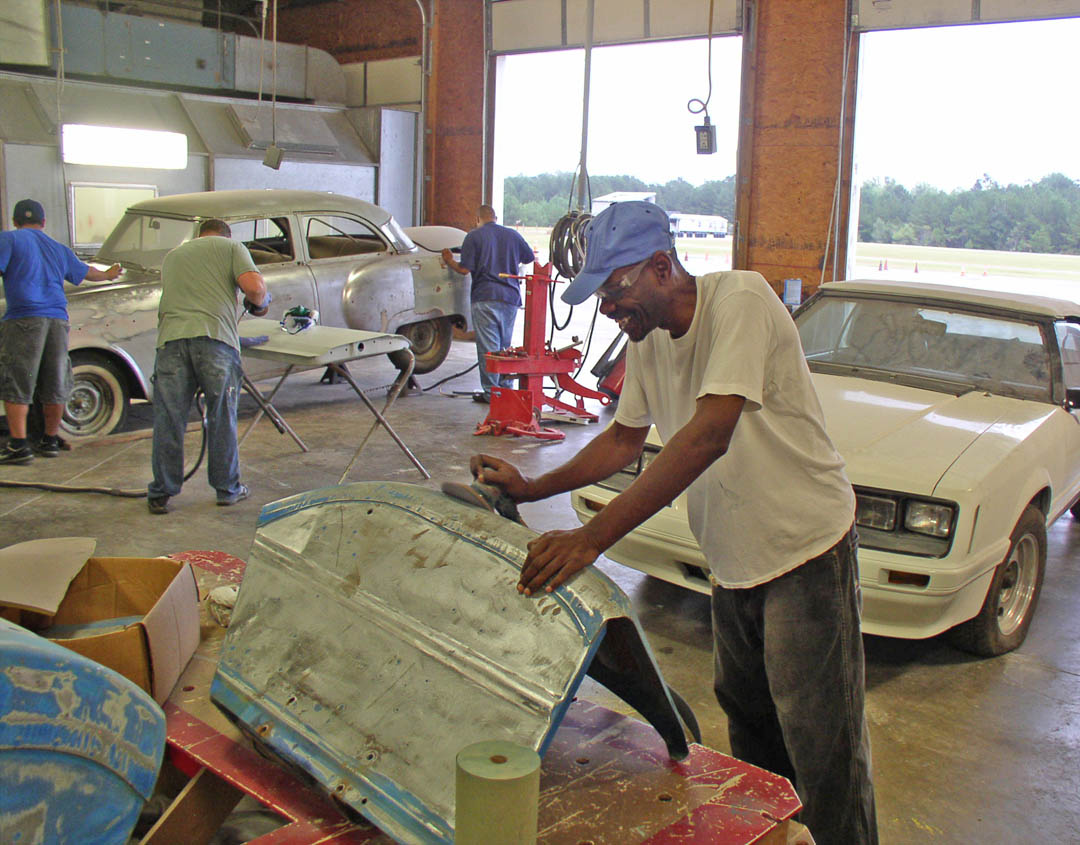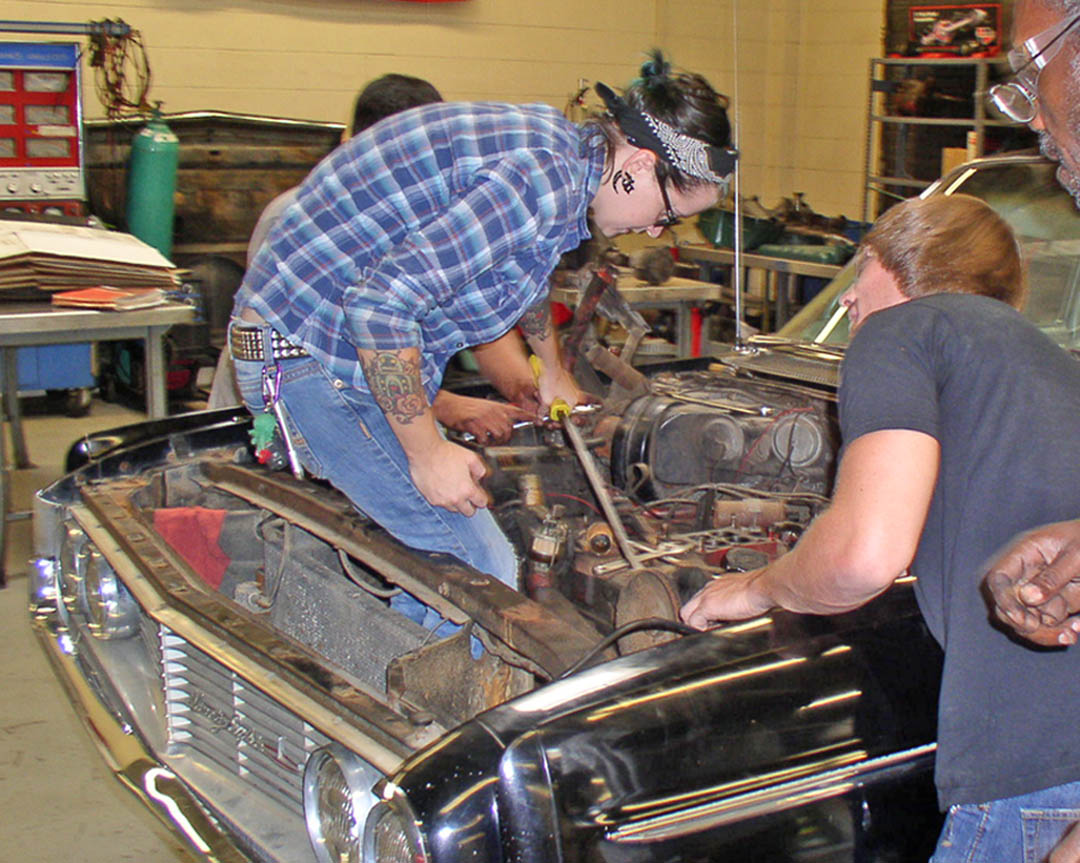
College News
CCCC Automotive Restoration program unique in state
11.29.2013 • College & Community, College General, Curriculum Programs, Students/Graduates
SANFORD - Ashley Cook becomes almost poetic when she talks about restoring old automobiles.
"There's something about turning a broken-down piece of American steel into something that looks like it just came off a showroom floor," said the former U.S. Army mechanic. "These old cars, they're Americana, they're vintage - it's like bringing back history."
Cook is learning the skills she needs to restore vintage vehicles in Central Carolina Community College's Automotive Restoration Technology program, the only program of its kind in the North Carolina Community College System.
It prepares students with the basic skills to restore vehicles that were manufactured in the years up to 1975. They can take a junker and restore it to its original condition, whether it is a classic car from the 1920s or 1930s, a vintage vehicle from the 1940s, or a muscle car from the 1950s or 1960s.
The automotive restoration program is a great career path, according to the instructors, with some graduates working with antique automobile collections in the Triangle area.
Some students look forward to being entrepreneurs and running their own businesses.
"It's absolutely a good career field," said instructor Pete Eckley. "There is a huge interest in restoring old automobiles. There are specialty restoration shops and television shows geared to automotive restoration. The following is amazing."
Money earned as an automotive restorer increases with the skill level. Pay can run from $12 per hour at the entry level up to about $25 per hour at a basic body shop. The more specialized the work, the higher the pay. Many skilled automotive restorers charge about $75 per hour. If that includes refabrication of parts, it can run $80 to $100 per hour.
"There's some really good income to be had in automotive restoration," Eckley said.
CCCC offers a three-semester diploma and a two-semester certificate in its curriculum Automotive Restoration Technology program. Classes run during the day at the college's Emergency Services Training Center, in Sanford. The college also offers the curriculum program specifically for high school students.
Students learn to repair or replace electrical and mechanical systems, rebuild engines, sand and paint, repair or replace non-structural body damage, rebuild transmissions, and fabricate parts that are no longer available.
All the instructors, Eckley, Billy Eubanks and Chuck Mann bring a lot of experience in restoration to their classes. Mann was serving as CCCC Transportation Department chair when he and then-CCCC President Marvin R. Joyner established the Automotive Restoration program in 2001. Eubanks started restoring cars when he was a teenager, back in the 1950s.
"I got into restoration because I was interested in antique cars," he said. "When I was a sophomore at Pittsboro High School, I restored a 1933 Ford and entered it in the 1958 Charlotte Car Show. I won my class and tied for best of show."
Since then, he has restored a wide variety of vintage cars. For the past 12 years, he has shared his extensive knowledge with the Automotive Restoration Technology students at CCCC.
Student David Strunks, of Sanford, has automotive restoration in his blood. His father, Ed Strunks, owns Ed's Collision Center and David works with him.
"I feel lucky that the only Automotive Restoration program at a community college in the state is in the town I live in," David said. "I enjoy waking up in the morning and coming to class, seeing a car that's something not very nice turn into something you can be proud of. My dad always tells me there will always be old cars that need to be fixed, so there will always be money in old cars."
For student Dan Houchins, of Cameron, automotive restoration is part of his training for an interesting second career. He retired from the U.S. Army in February, after 24 years of service, including Afghanistan and Iraq.
Houchins knew what he wanted to do: refurbish and rebuild classic motorcycles, those built in 1975 or earlier. He received his Motorcycle Mechanics diploma from CCCC in May and is now working on his diploma in automotive restoration.
"I'm definitely getting good skills in this program," he said. "I'm learning a lot of skill sets in repairing non-structural damage, upholstery, welding, etc., that will set things up for what I need. I have my own garage where I work, but, with these skills, I hope to work up to hanging out my own shingle."
For more information about Central Carolina Community College's Automotive Restoration Technology program, visit www.cccc.edu or contact instructor Chuck Mann at 919-718-7303 or cmann@cccc.edu.

Central Carolina Community College offers the only Automotive Restoration Technology program at a North Carolina community college. Students learn the skills to restore, repair and refabricate parts for cars built in 1975 or earlier in order to restore them to their pristine condition. Student Tony McCormick (front), sands a fender. A Mustang that is almost completely restored is behind him. In the rear (from left) Suriel Marroquin, Tracy Blackburn and Eddie Drye sand a 1952 Packard Clipper. For more information about Central Carolina Community College's Automotive Restoration Technology program, visit www.cccc.edu or contact instructor Chuck Mann at 919-718-7303 or cmann@cccc.edu/.

Central Carolina Community College offers the only Automotive Restoration Technology program at a North Carolina community college. Students learn the skills to restore, repair and refabricate parts for cars built in 1975 or earlier in order to restore them to their pristine condition. Students Ashley Cook (in engine compartment), Jacob Decker (right), and others work to remove the engine of a 1962 Oldsmobile '98 so it can be worked on. For more information about Central Carolina Community College's Automotive Restoration Technology program, visit www.cccc.edu or contact instructor Chuck Mann at 919-718-7303 or cmann@cccc.edu/.
- Central Carolina Community College
- Serving Chatham, Harnett, & Lee Counties, NC
- 1-800-682-8353


